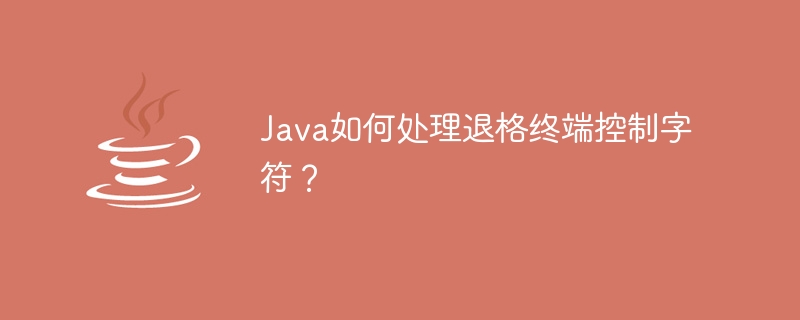How does Java handle backspace terminal control characters?

The backspace terminal control character is a special character represented by "\b" notation. It is used to move the cursor backward one character. It belongs to Java escape characters, which are characters used with backslash (\) that have special meaning to the compiler. In this article, we will understand and see the actual implementation of ‘\b’ notation through a Java sample program.
Backspace terminal control character working
Two situations may occur when using this escape character. First, when we hardcode the backspace character into a string, and second, when we use the keyboard for input.
Speaking of the first case, Java itself does not handle the backspace terminal control character. It just writes the byte value of the character to the output stream and then it's up to the terminal or console to interpret it. Some terminals may remove the previous character, while others may display strange symbols, or a few may ignore it.
Let us understand the previous points through an example
Example
public class BackspaceExample {
public static void main(String[] args) {
System.out.println("Tutorialss\bPoint");
}
}
Output 1
TutorialssPoint
However, when the above code is compiled and executed on VS Code, it produces the following results.
Output 2
TutorialsPoint
We can see that the two compilers produce different results. Thus, it is proven that the backspace terminal control character is interpreted according to the terminal it was compiled for.
When reading user input using the "Scanner" class or any other input method, Java treats the backspace character as a regular character. It does not automatically interpret it as a special operation. In other words, when using the backspace symbol, the console will display the backspace character as-is and the previous character will not be removed from the input.
Let us take an example where we will collect user input for better understand
Example
import java.util.Scanner;
public class Input {
public static void main(String []args) {
Scanner read = new Scanner(System.in);
System.out.println("Enter a String: ");
while(read.hasNext()) { // runs till the last character
String st = read.nextLine();
System.out.println("String value: " + st);
}
}
}
Output
Enter a String: Shriansh\bKumar String value: Shriansh\bKumar
As mentioned before, placing backspace characters into user input values is not considered a special operation. We can see in the output that the "\b" character is printed as is. In the above code, we create an instance of the "Scanner" class and read and write the user-provided input using a while loop.
in conclusion
The conclusion of this article is that we cannot rely on the backspace terminal control character to remove any characters from a string in Java because the way it works may vary depending on the terminal or compiler. Additionally, Java treats the backspace character as a regular character when it comes to user input. If we want to remove characters from string in Java, we should use other methods like "substring", "replace" or "StringBuilder" and "StringBuffer".
The above is the detailed content of How does Java handle backspace terminal control characters?. For more information, please follow other related articles on the PHP Chinese website!

Hot AI Tools

Undresser.AI Undress
AI-powered app for creating realistic nude photos

AI Clothes Remover
Online AI tool for removing clothes from photos.

Undress AI Tool
Undress images for free

Clothoff.io
AI clothes remover

AI Hentai Generator
Generate AI Hentai for free.

Hot Article

Hot Tools

Notepad++7.3.1
Easy-to-use and free code editor

SublimeText3 Chinese version
Chinese version, very easy to use

Zend Studio 13.0.1
Powerful PHP integrated development environment

Dreamweaver CS6
Visual web development tools

SublimeText3 Mac version
God-level code editing software (SublimeText3)

Hot Topics
 1381
1381
 52
52
 How does Java's classloading mechanism work, including different classloaders and their delegation models?
Mar 17, 2025 pm 05:35 PM
How does Java's classloading mechanism work, including different classloaders and their delegation models?
Mar 17, 2025 pm 05:35 PM
Java's classloading involves loading, linking, and initializing classes using a hierarchical system with Bootstrap, Extension, and Application classloaders. The parent delegation model ensures core classes are loaded first, affecting custom class loa
 How do I implement multi-level caching in Java applications using libraries like Caffeine or Guava Cache?
Mar 17, 2025 pm 05:44 PM
How do I implement multi-level caching in Java applications using libraries like Caffeine or Guava Cache?
Mar 17, 2025 pm 05:44 PM
The article discusses implementing multi-level caching in Java using Caffeine and Guava Cache to enhance application performance. It covers setup, integration, and performance benefits, along with configuration and eviction policy management best pra
 How can I use JPA (Java Persistence API) for object-relational mapping with advanced features like caching and lazy loading?
Mar 17, 2025 pm 05:43 PM
How can I use JPA (Java Persistence API) for object-relational mapping with advanced features like caching and lazy loading?
Mar 17, 2025 pm 05:43 PM
The article discusses using JPA for object-relational mapping with advanced features like caching and lazy loading. It covers setup, entity mapping, and best practices for optimizing performance while highlighting potential pitfalls.[159 characters]
 How do I use Maven or Gradle for advanced Java project management, build automation, and dependency resolution?
Mar 17, 2025 pm 05:46 PM
How do I use Maven or Gradle for advanced Java project management, build automation, and dependency resolution?
Mar 17, 2025 pm 05:46 PM
The article discusses using Maven and Gradle for Java project management, build automation, and dependency resolution, comparing their approaches and optimization strategies.
 How do I create and use custom Java libraries (JAR files) with proper versioning and dependency management?
Mar 17, 2025 pm 05:45 PM
How do I create and use custom Java libraries (JAR files) with proper versioning and dependency management?
Mar 17, 2025 pm 05:45 PM
The article discusses creating and using custom Java libraries (JAR files) with proper versioning and dependency management, using tools like Maven and Gradle.




